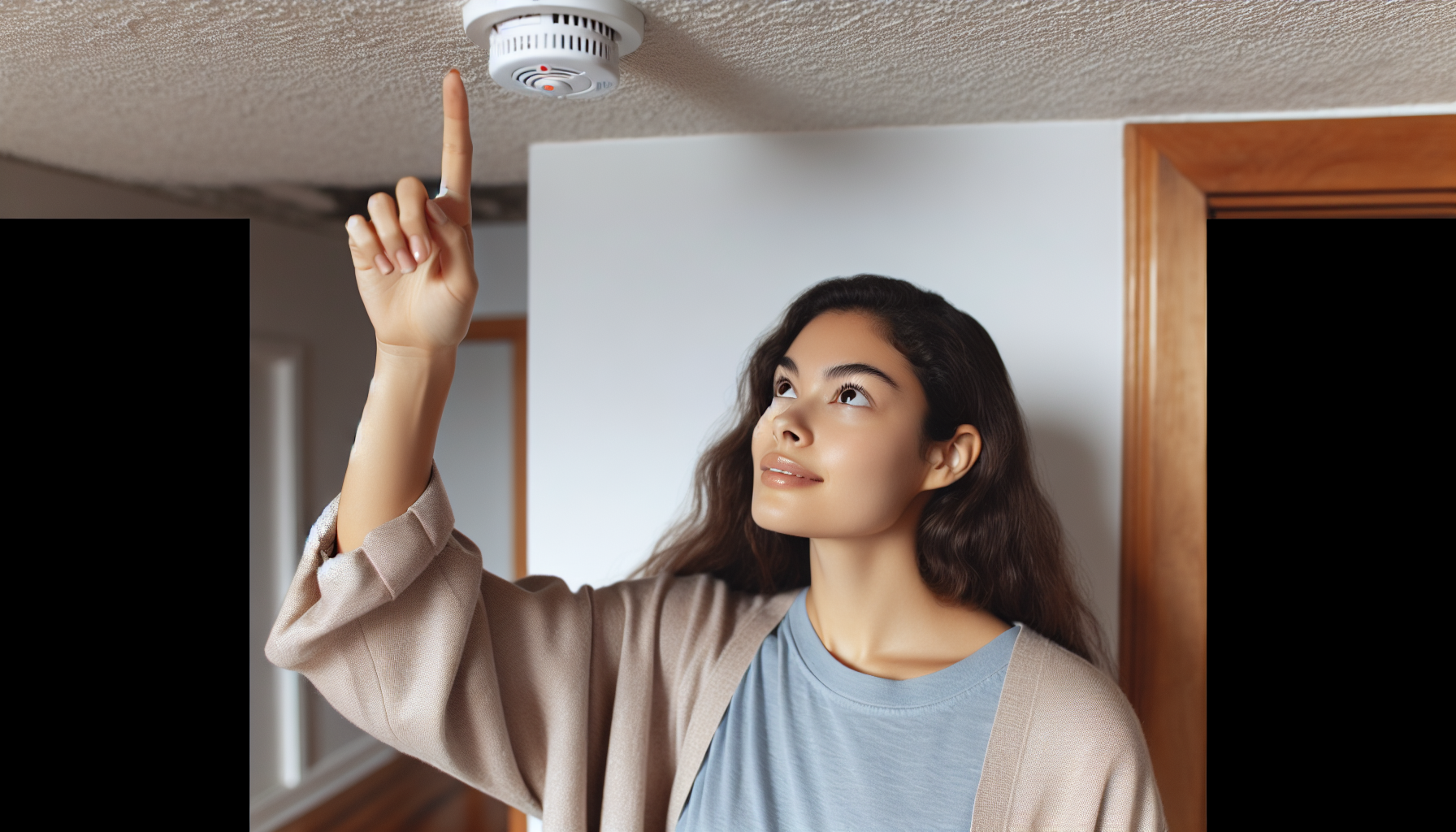Every 8 to 10 years—that’s “how long do battery smoke alarms last” before you should consider replacing them for home safety. This brief guide will enlighten you on maintaining your alarm’s longevity and recognizing when it’s time to install a new one, keeping you ahead of potential hazards.
Key Takeaways
- Battery-operated smoke alarms should be replaced every 8 to 10 years, with 10-year lithium battery alarms being more convenient due to the lack of battery replacement needs.
- Maintenance of battery smoke alarms includes monthly testing, annual battery replacement for non-sealed units, and regular cleaning to ensure optimal functionality and safety.
- The NFPA recommends smoke alarms be replaced every 10 years and batteries be changed every 6 months, with proper installation and the use of interconnected systems to improve alert coverage throughout a home.
Battery Smoke Alarm Lifespan

Smoke alarms are essential devices for household safety, providing early warning of fire hazards. However, like all electronic devices, they don’t last forever. The National Fire Protection Association (NFPA) reveals that battery-operated smoke alarms usually last between 8 to 10 years. It’s therefore recommended to replace smoke alarms every 10 years, counting from their manufacturing date, to ensure peak performance.
If you can’t determine the manufacturing date of a smoke alarm, it’s safer to replace it immediately to maintain safety.
Standard Battery-Operated Alarms
Standard battery-operated smoke alarms are a common choice for many homeowners due to their simplicity and cost-effectiveness. These alarms typically have a lifespan of 5 to 10 years. Given their lifespan, it’s recommended to replace these alarms every 5 to 10 years accordingly.
10-Year Lithium Battery Alarms
10-year lithium battery alarms are a step up, offering a built-in battery that lasts for the entire lifespan of the alarm. This eliminates the need for periodic battery replacements, saving time and effort. However, if such an alarm begins to chirp, signaling a low battery before the expected decade lifespan, it indicates the need for an immediate replacement of the entire alarm unit.
Maintaining Your Battery Smoke Alarms for Optimal Performance

So, you now know the typical lifespan of battery-operated smoke alarms, but how can you ensure they function optimally throughout this period? The secret lies in regular testing, timely battery replacement, and periodic cleaning.
Regular Testing
Regular testing is crucial to ensure your smoke alarms are always ready to alert you to potential hazards. To do this, press and hold the ‘test’ button at least once a month. A loud beep will confirm that the alarm is functioning properly.
This simple procedure ensures that your smoke alarm is in good working condition, offering you peace of mind.
Battery Replacement Frequency

Aside from testing, another key maintenance task is to change the batteries. For smoke alarms that do not have sealed, long-life batteries, replaceable batteries should be changed at least once a year or whenever the low battery signal chirps. This ensures that your alarm remains functional and ready to alert you when needed.
Cleaning and Dusting
Regular cleaning and dusting extend the life of your smoke alarms and enhance their performance. To clean a smoke alarm, use a vacuum cleaner with a brush attachment to clear the inside of the unit and wipe the outside vents gently with a clean wipe and mild detergent.
Always follow the manufacturer’s cleaning instructions to ensure that your smoke alarms continue to function correctly.
Hardwired vs. Battery-Operated Smoke Alarms
With a clear understanding of battery-operated smoke alarms, you might wonder how they compare to their hardwired counterparts. Hardwired smoke alarms, connected to a home’s electrical system, typically offer up to 10 years of protection and are generally considered more reliable due to their constant power supply. However, they still require a battery backup, which needs to be replaced every 2-3 years, to ensure operation during power outages.
The interconnected design of hardwired smoke alarms means that if one alarm detects a fire, all alarms will sound, enhancing safety by providing an immediate alert throughout the building. However, installing these hard wired alarms, such as hardwired smoke detectors, often necessitates the services of a qualified electrician to work with the home’s electrical system, raising the installation cost.
On the other hand, battery-operated smoke alarms:
- Are less complex to install and don’t require technical skills
- May be less dependable than hardwired alarms in terms of uninterrupted power supply, especially during a power outage
- Offer the advantage of easy installation and mobility, making them suitable for rental properties or temporary residences.
Recognizing Signs That It's Time to Replace Your Battery Smoke Alarm
Knowing when to replace your smoke alarm is crucial for your safety. Regular beeping or chirping could indicate a low battery or need for maintenance if in a pattern of one beep or a chirp followed by a pause. However, if you hear two beeps followed by a pause, it’s usually time to replace the entire smoke alarm, not just the battery.
Temperature drops, especially at night, may lead to chirping due to increased internal resistance from low battery power. Additionally, if a smoke detector chirps consistently even after battery replacement or fails the recommended monthly test, it should be replaced.
Finally, if your smoke alarm is over 10 years old, it should be replaced regardless of whether it’s showing any signs of malfunction.
The Cost of Replacing Battery Smoke Alarms
Replacing smoke alarms is an investment in your safety. The cost of battery-operated smoke detectors can range from as little as $5 for basic models, up to $150 or more for advanced smart, interconnected devices. The total cost can be influenced by local building codes that specify the number and placement of smoke detectors, which could require purchasing additional units.
While most smoke detectors don’t have monitoring subscription fees, opting for extended warranties on high-end models can increase costs by up to $50 for two years. If you decide to go for professional installation, service providers commonly charge $35 to $40 per detector, with an additional service fee around $50.
National Fire Protection Association Recommendations
The National Fire Protection Association (NFPA) is a trusted authority when it comes to fire safety. They recommend that smoke detectors be installed in specific locations within the home to ensure maximum detection capability. For instance, installing smoke alarms on ceilings or high on walls takes advantage of the natural rise of smoke.
For proper maintenance of smoke detectors, the NFPA recommends replacing the smoke detector batteries at least every 6 months to ensure functionality. Adhering to these recommendations can significantly enhance the effectiveness of your smoke alarms.
Tips for Choosing the Right Smoke Alarm for Your Home
Choosing the right smoke alarm for your home is not just about cost and lifespan. Other factors like the type of alarm, advanced features, and specific requirements should also be considered. For instance, photoelectric smoke alarms are recommended near kitchens and bathrooms, while dual sensor alarms combining ionization and photoelectric sensors are advised for broad coverage.
Interconnected smoke alarm systems, as recommended by the NFPA, ensure that when one alarm goes off, all alarms sound, providing faster alert coverage throughout the home. Advanced features such as co detectors, which include:
- CO detector (carbon monoxide detection)
- heat sensors
- certification by recognized testing laboratories
- smart connectivity
can also enhance safety and convenience.
For special requirements, selecting alarms with multi-criteria technology can reduce nuisance alarms, and alarms with features catering to individuals with hearing disabilities should be listed by a qualified testing laboratory.
Summary
In summary, ensuring the optimal performance and lifespan of your smoke alarms requires regular testing, timely battery replacement, and periodic cleaning. It’s important to replace your smoke alarms every 8 to 10 years or sooner if they show signs of malfunction.
While the cost of replacing smoke alarms can vary, it’s an investment in your safety that’s worth every penny. By following these guidelines and the recommendations of the NFPA, you can ensure that your home is well-equipped to alert you early in the event of a fire, giving you the precious time needed to evacuate safely.
Frequently Asked Questions
How long should a smoke alarm battery last?
Replace the battery in your smoke alarm every 6 months if it's powered by a nine-volt battery. If it's a 10-year lithium-powered fire detector, you won't need to replace the battery.
How often should you replace battery operated smoke detectors?
You should test your smoke alarm monthly, replace its batteries every six months, and replace the detector itself every ten years to ensure its proper functioning.
How do I know if my smoke detector needs a new battery?
If you hear your smoke detector beeping in brief chirps every 30-60 seconds, it's an indication that the battery needs to be replaced. Additionally, it's recommended to replace each alarm at least every 10 years, as alarm sensors wear out.
How often should I test my smoke alarms?
You should test your smoke alarms at least once a month to ensure they are functioning properly.
Can I replace the battery in a 10-year lithium battery alarm?
No, the battery in a 10-year lithium battery alarm is built-in and lasts for the entire lifespan of the alarm.
You Might Also Like...










